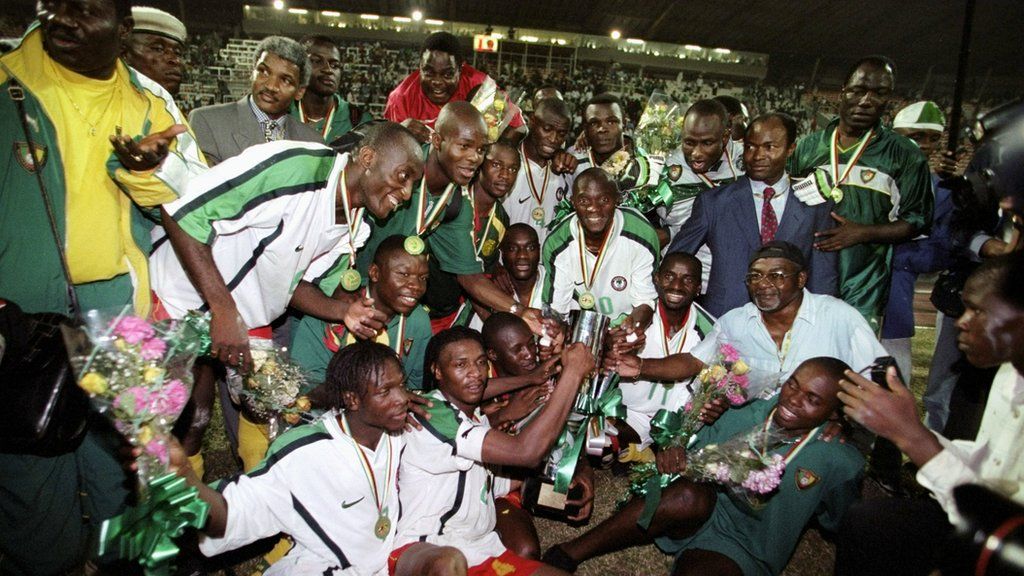Cameroon vs Nigeria: The making of Africa's biggest football rivalry
- Published

Cameroon players - many wearing Nigeria strips after swapping shirts - celebrate winning the 2000 Afcon final against the Super Eagles in Lagos
Africa Cup of Nations 2023 last 16: Nigeria v Cameroon | |
|---|---|
Venue: Felix Houphouet-Boigny Stadium, Abidjan Date: Saturday, 27 January Kick-off: 20:00 GMT Coverage: Live on BBC Three and BBC iPlayer (UK only) with live text commentary on BBC Sport website |
When the final whistle blew after Cameroon sealed a dramatic stoppage-time win over The Gambia in their final Group C game at the 2023 Africa Cup of Nations, another chapter in one of the continent's greatest rivalries was confirmed.
That 3-2 victory for the Indomitable Lions set up a last-16 clash with neighbours Nigeria at an iconic venue in Abidjan which holds history for both sides.
The two countries are undoubtedly among Africa's biggest footballing nations, with eight continental titles and two Olympic gold medals between them.
"It's the biggest fixture in African football, in terms of rivalry and history between both sides," former Nigeria captain Mutiu Adepoju told BBC Sport Africa.
"Cameroon has denied Nigeria the Nations Cup title in three finals. No other country can boast that in Africa."
Saturday's game at the Felix Houphouet-Boigny Stadium in Abidjan will be a repeat of the 1984 Afcon final held at the same venue.
On that occasion Cameroon, with stars like Roger Milla, Joseph-Antoine Bell and Theophile Abega, won 3-1 against a young Super Eagles team led by the late Stephen Keshi.
Another painful defeat followed for Nigeria at the 1988 Afcon held in Morocco, with the Indomitable Lions sealing a second Nations Cup title at the expense of the West Africans courtesy of a goal scored from the penalty spot by Emmanuel Kunde.
The next high-profile encounter between the rivals was yet another final, held at the Lagos National Stadium for the Afcon 2000 tournament, co-hosted by Ghana and Nigeria.
Playing on home soil, the Super Eagles had fervent fan support and pressure in equal measure as they sought to avenge the pains of the past.
"There was lot of anxiety in the camp before the final, because we knew Cameroon had many good players and history was on their side," Benedict Akwuegbu, who was a member of the 2000 squad, told BBC Sport Africa.
"They had players like Patrick Mboma, Samuel Eto'o and Rigobert Song, but sadly for us, it went into penalties and we lost again."
The 2000 Afcon final loss on home soil, 4-3 on spot-kicks after a 2-2 draw, effectively sealed Cameroon's fate as Nigeria's nemesis in African football.
That third final victory over their rivals earned Cameroon the opportunity to keep the Afcon trophy (then called the Trophy of African Unity) for keeps, and denied Nigeria what would have been their third title.
Forty years down the road in Abidjan...
Cameroon won three Africa Cup of Nations finals against Nigeria, in 1984, 1988 and 2000 - with the last of those on penalties after a 2-2 draw
Revenge, bragging rights and regional rivalry will be the talking points on Saturday at 20:00 GMT, with a place in the quarter-finals up for grabs.
It will be the 25th meeting between Nigeria and Cameroon across all competitions and an eighth Afcon meeting between the two heavyweights.
Nigeria hold a better head-to-head record of 12 wins and eight draws over their rivals, who have admittedly won the much bigger fixtures.
"Cameroon and Nigeria are neighbours so they are the biggest rivals from back in the day," former Cameroon forward Patrick Suffo told BBC World Football.
"But in those hard games, that's where we show our true colours."
Both sides have endured a nervy start to their campaign in Ivory Coast, with the Super Eagles scoring only twice from open play at the tournament, despite boasting an attacking depth which includes African Footballer of the Year Victor Osimhen.
"The coach (Jose Peseiro) needs a supporting striker to play upfront with Osimhen," says Akwuegbu.
"The goals will come if we play our traditional 4-4-2 formation."
The last Afcon meeting between Nigeria and Cameroon came at the same stage of the competition in Egypt in 2019.
Former Watford and Manchester United striker Odion Ighalo scored twice as the Super Eagles beat the Indomitable Lions 3-2 to eliminate the defending champions, before Nigeria went on to finish third.
"There is no room for errors, especially when you are playing against a team like Cameroon," added 53-year-old Adepoju.
"We must take our chances because they may not come again."
What are the fans saying in Lagos?
Nigeria striker Victor Osimhen (left) and Cameroon forward Karl Toko Ekambi (right) have one goal apiece at the Afcon finals
"It's the biggest fixture in African football. I get scared whenever it's Nigeria against Cameroon at any level. I watched the Afcon 2000 final as a young kid and the memories of that defeat have never left my mind any time we play them. I hope the Eagles win on Saturday." Nigeria fan Lanre Vigo
"I watched the 1984 Afcon final where a young Nigeria side lost to a very strong Cameroon team. The current Nigeria squad is far better than our opponent. We only need to work on our tactical approach to the game and be focused on winning at all cost." Grassroot sport manager Anthony Adeboye
"It's always like a war whenever it's time for Nigeria to play Cameroon. Everyone knows it is an important fixture, where pride and bragging rights are at stake. We can't forget the three Afcon final losses, so we take every game as a revenge mission." Football coach Seun Savage